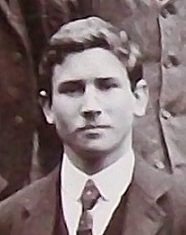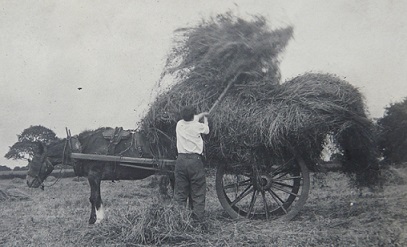Each Whitsuntide saw the annual meeting in York of the Old York Scholars’ Association, and these meetings are reported in the school magazine “Bootham”.
In 1915 however, the meeting could not be held in York. Instead the Old Scholars met in London. In “Bootham”, Robert O. Mennell (B. 1897-1900) wrote:
“Whitsuntide 1915. KEW, Richmond-on-Thames, Westminster Bridge, and Croydon are strange place names to associate with the Old York Scholars’ Whitsuntide Gathering. Yet so it was; and the memory of the coloured loveliness of Kew and the silent beauty of the Thames in twilight will long be treasured by those who were there. But the London gathering will be remembered not so much for these or any other outward impressions as for the spirit that pervaded the meeting at Richmond—the sense of appalling need and the imperative call to render peace service in the midst of war.
T. Edmund Harvey and Philip J. Baker had come straight from the battle zones of France and Flanders, one from the devastated villages of the Marne, the other from the shattered city of Ypres, and their outline sketches of the relief work going forward under their direction seemed to bring the tragedy home as nothing less personal could have done. Other aspects of war’s cruel battering of humanity were portrayed by Ivy Weston in her picture of Folkestone Harbour invaded daily by crowds of ravenous refugees, and by Florence Barrow in her descriptions of the plight of “enemy-aliens” in this country.
In all the work of succour described—work undertaken in the spirit of a common humanity and with the single aim of healing and of reconciliation— the challenge of fine example lent point to the call made to us to render “special service in this time of supreme needs.”
Another form of service, less looked for perhaps from the Old Scholars of a Friends’ School, but undertaken in response to the stern call of duty and with entire disregard of personal interest or personal risk, was brought vividly before us by the khaki uniforms of some of our members, by a letter read from an Old Scholar in the trenches, and with peculiar force by the Head Master’s mention of those whose offer of the supreme sacrifice had already been accepted.
For every reason this annual meeting of the Associations must remain one of historic significance. The run down the river to Westminster Bridge, in the fading light, made a fitting close to the day.”

In 1916, the Whitsuntide meeting returned to York. In “Bootham”, Robert O. Mennell wrote again:
“Whitsuntide, 1916. To be back at York again for Old Scholars was to realise how much we all had lost by meeting- away from the Schools last year. But familiar surroundings were not sufficient to dispel a feeling of unfamiliarity, if not unreality, in all the proceedings. It must have seemed to many that we had come back to York only to find that the heart of things was not there, but in the ends of the earth—anywhere but at York. The explanation was simple. Where your comrades are, there will your heart be also. Our men were out in all parts of the world “on service,” and our thoughts inevitably were much more with them than in the business before us. Throughout the week-end each occasion and each fresh face encountered seemed to send our minds bounding off in search of an absentee, and wondering what particular duty was holding him fast, and what his particular “somewhere” was meaning for him.
In no previous year probably have Old Yorkists been so widely separated geographically or in thought; and yet never, perhaps, has the sense of our school motto, “Membra sumus corporis magni,” been so consciously or so fully realised. We know now that neither distances nor differences can injure our abiding sense of unity in the Bootham fellowship and in our common Bootham heritage—the tradition of cleanness of life and conduct, of honesty and of unostentatious obedience to duty.
It has been given to our generation by a tragic fate to know what war really is. Though borne down by a sense of its immeasurable tragedy, we may allow ourselves some gratification in the thought that the great tradition has been upheld. The call of duty has made a different demand of every individual of us and taken us into widely different spheres of service. When it is all over we shall come back welded by our ordeals and experiences into a closer fellowship than ever, with a still greater duty before us, to take our part in helping to mould the future, inspired, as our Headmaster put it, by a staunch faith in spiritual forces, in the power of loving kindness and courageous endurance. Work performed in that spirit in the interest of civilisation will not fail to bear fruit.”
At the 1916 meeting, Helen Baynes, President of the Mount Old Scholars’ Association, spoke about how valuable and helpful the Schools’ mottoes were, especially in the current times:
“” I have been thinking,” the speaker continued, ” how extremely valuable and helpful just now the School’s mottoes are—’ Membra sumus corporis magni ‘ and ‘ Ad omnia paratus.’ They seem to have been made specially for this year, for these times in which we are living-. We are all members of a great body, whether we regard ourselves as members of schools or members of a religious society, of the nation or of the Empire, and we may even go so far as to think of ourselves as members of a common humanity. As such we have, of course, great privileges, but as such also we have great responsibilities. I think it must be a matter of great happiness to all of us who are older members of this Association to see how finely prepared for everything many of our younger Old Scholars have been: those who are now working maybe with the Friends’ Ambulance Unit, possibly with the refugees in Corsica, Holland, France, or in England, alleviating the distress of aliens and others, or upholding the freedom that has been our priceless possession for so long, by their sufferings for conscience’ sake. It seems that into whatever service our members have entered they have, in most cases, been prepared for almost everything.
” We all hope and believe—do we not?—that a new and beautiful future is going to be born from this terrible turmoil —that a new heaven and a new earth will be built on the ruins of the old. But this will only come about if each one is prepared for whatever may come, if we are making ourselves prepared for this future that we hope is to be so much happier for humanity. Those who are now at school have a glorious future before them, I believe; and now is the very opportunity for choosing what they will do and for preparing themselves thoroughly for that future. There are opportunities of training now that have never been open in the past; there are opportunities for work that have never been open before.””

James Edmund Clark recalled the meeting at Richmond last year, when the desire to render service during this war time had materialised in the suggestion to raise a fund in the hope that it would reach £2,000 or £2,500 in aid of the various causes in which Friends were specially engaged.
“In the appeal which was sent out it was suggested that Old Scholars who wished to do so should indicate to what special activity they would like their money applied. The five objects were: The training of women and men; equipment and maintenance; the War Victims’ Relief Committee work; the Friends’ Ambulance Unit; and the Emergency Committee for the assistance of distressed Germans, Austrians, and Hungarians in this country.
It was pleasing to be able to report that the original purpose had been more than accomplished, a little over £2,800 having been promised or subscribed. Grants amounting to £1,755 had been made as under:
Training … … … … …£225
Equipment … … … … … £100
F.W.V.R … … … … …£650
F.A.U … … … … …£550
Emergency Committee … £230
Bootham stood behind the Mount in the matter of the number of contributors, with only 160 against 230. Contributions to correct this state of affairs, and to bring the total to £3,000, would still be cordially welcomed.
There had been one or two donations of particular interest: £7 as the result of the work that some of the boys at Bootham had done in the harvest fields last summer (with a prospect of a further contribution from harvesting and fruit picking in the coming season)*.”
(* August 8. Cheque for over £25 has already come for work done during last term.)”
